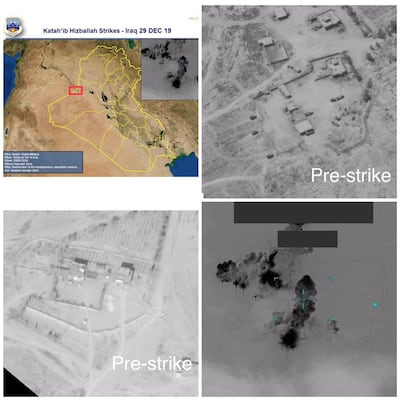The United States said it may take "additional actions" in the region after carrying out air strikes in Iraq and Syria against an Iran-backed militia.
The US military struck five Kataib Hezbollah locations in response to a rocket attack on a military base in Kirkuk that killed an American civilian contractor and wounded four soldiers.
Nineteen militia fighters were killed, the US said, though Iraqi security and militia sources put the number at 25, with more than 50 wounded.
"We will not stand for the Islamic Republic of Iran to take actions that put American men and women in jeopardy," Secretary of State Mike Pompeo said after briefing US President Donald Trump.
Mr Pompeo, Defence Secretary Mark Esper and Gen Mark Milley, chairman of the US Joint Chiefs of Staff, appeared briefly in a ballroom at Mr Trump's Mar-a-Lago Florida retreat to comment on the air strikes.

Mr Esper termed the strikes "successful," but said that Mr Trump was informed that a further military response could be warranted.
"We discussed with him other options that are available," Mr Esper said.
"I would note also that we will take additional actions as necessary to ensure that we act in our own self defence and we deter further bad behaviour from militia groups or from Iran."
Kataib Hezbollah has "strong links" with the Islamic Revolutionary Guard Corps' Quds Force and "has repeatedly received lethal aid and other support from Iran that it has used to attack coalition forces", said Jonathan Hoffman, assistant to the Secretary of Defence.
The American-led coalition to fight ISIS is called Operation Inherent Resolve.
At least four local Kataib Hezbollah commanders were among the dead, Iraqi security and militia sources said. One of the strikes hit the militia's headquarters near the western Qaim district on the border with Syria, they said.
The Pentagon said it had struck three locations belonging to the Iranian-backed group in Iraq and two in Syria.
They included weapons stores and command and control locations the group used to plan and carry out attacks on coalition forces, it said.
A US official said the strikes were carried out by F-15 fighter jets.

Mr Pompeo had previously blamed Iranian proxies in the country for an attack on a joint facility in Baghdad on December 9.
While no group claimed responsibility for the Kirkuk base attack, Mr Hoffman blamed the group for the attack.
“Recent [Kataib Hezbollah] strikes included a 30-plus rocket attack on an Iraqi base near Kirkuk that resulted in the death of a US citizen and injured four US service members and two members of the Iraqi Security Forces," he said on Sunday.
The group is led by Iraqi-Iranian Abu Mahdi Al Muhandis, a leader within the Popular Mobilisation Forces who once worked with Iran's Revolutionary Guard Corps in opposition to Saddam Hussein.
They killed hundreds of US soldiers during the insurgency that followed the 2003 US-led invasion to topple Saddam and have long been sanctioned by the US Treasury as a terrorist group.
US forces remain in Iraq and Syria as part of efforts to thwart ISIS, which continues to operate in the two countries and has increasingly been using guerrilla tactics in its attempts to regain a foothold.
Mr Esper also expressed concern to outgoing Prime Minister Adel Abdul Mahdi about attacks on bases in Iraq where US troops and weapons might be.
The defence department said Mr Esper and Mr Abdul Mahdi "shared with each other their commitment to seeing these" Kataib Hezbollah attacks on Iraqi security forces and Operation Inherent Resolve forces "cease once and for all".
There have been repeated attacks on bases housing US troops across Iraq and near the US embassy in Baghdad in recent months amid escalating tension between America and Iran.
Mr Trump withdrew from the 2015 Iran nuclear accord with world powers last year and reimposed sanctions on Tehran.
The US also blamed Iran for attacks on shipping in the Arabian Gulf in recent months, and a massive attack on Aramco oil installations in Saudi Arabia.
Tehran has denied the claims.

